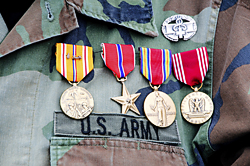The Gilmer Mirror | By Nathan L. Hecht and William H. McRaven
Alex, a third-generation Army veteran with eight years’ service, escaped with her two young boys from an abusive home. With nowhere else to turn, she was staying with a friend when she sought help at a legal clinic. Her lawyer got court protection for her and her boys and helped her get back on her feet.
Alex’s legal fees: zero.
Alex is a pseudonym to continue to protect her, but she’s a real person.
So is Roger, a 65-year-old disabled veteran who appealed to a legal aid office for help paying a minor ticket. The lawyer helping Roger discovered he faced a legal problem much worse than a ticket. He was about to lose his home because of delinquent property taxes. Within a month, the lawyer got a court to halt the tax suit against Roger’s home.
Result: one less veteran facing homelessness in the U.S.
For veterans like Alex and Roger, legal problems can seem insurmountable. Nearly 1.5 million veterans live in poverty, according to 2012 figures by the U.S. Census Bureau. And veterans are almost 9 percent of the homeless adult population. Homelessness and poverty hit younger veterans especially hard.
To help celebrate Veterans Day, legal aid lawyers across the state will hold special clinics and workshops during Texas Veterans Legal Aid Week—November 9-13— to help our veterans with legal problems like Alex’s and Roger’s—and so many more. Too many more.
Legal aid can be a lifeline.
Helping veterans get help is critical.
Legal aid provides basic civil legal services to the poor, not only for veterans returning home, but also for victims of domestic violence, the elderly facing foreclosure of their homes, and children in difficulty. Nearly 6 million Texans qualify for civil legal aid. The Texas Access to Justice Foundation, created in 1984 to fund civil legal aid in Texas, stands committed to a vision that all Texans deserve equal access to justice, regardless of income. The Foundation recently awarded more than $63 million in grants to 30 Texas legal aid providers for basic civil legal services to low-income Texans. In 2014, these grants helped more than 7,000 veterans get access to the justice system.
Add to that the millions of hours Texas lawyers every year donate pro bono—for the public good—to represent our state’s lowest-income citizens for free. Texas lawyers also donate millions of dollars each year to fight for better legal representation for people living on the edge.
But lawyers in private practice and legal aid providers can’t do it all. The need is too great. Earlier this year, the 84th Texas Legislature recognized that need and appropriated $17.56 million in general revenue for basic civil legal aid for disadvantaged Texans. For veterans specifically, the Legislature provided an additional $3 million for expanded services. That leadership has been crucial in helping ensure access to justice.
Military service is challenging. Deployment means long, distant separations from family and home. It means leaving loved ones to face life’s pressures without you, worrying that you’re OK. It means facing danger, putting your life on the line, with all the stress on body and mind that comes with it.
You do all this because you love your country and her values and ways of life. You serve because you love liberty and you’re willing to give all you have to preserve it.
But returning from service is also challenging. Veterans struggle to readjust, hold on to their families and their health, find jobs and pay the rent.
We salute our military men and women returning home. One critical way to honor their service is to guarantee for them the promises of America’s civil justice system and the rule of law that they fought bravely to preserve.
Vets answered our call. Now it’s our turn.
Visit: www.texaslawhelp.org/veterans or call 1-800-622-2520, option 2, for more information.
###
Nathan L. Hecht is Chief Justice of the Texas Supreme Court and a veteran of the U.S. Navy Reserve Judge Advocate General’s Corps.
William H. McRaven is Chancellor of The University of Texas System, having recently retired as the U.S. Navy 4-star admiral in command of special operations, including the Navy SEALs.



